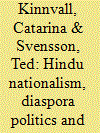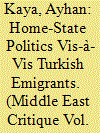| Srl | Item |
| 1 |
ID:
148167


|
|
|
|
|
| Summary/Abstract |
[D]iaspora politics can be viewed as not only enhancing or challenging state power in particular cases, but also contributing to new forms of global identity politics that transcend state institutions.”
|
|
|
|
|
|
|
|
|
|
|
|
|
|
|
|
| 2 |
ID:
096284


|
|
|
|
|
| Publication |
2010.
|
| Summary/Abstract |
This article proceeds from a critical reading of the role of religion for nation-building in India. In particular, the authors discuss how the Indian notion of secularism relies upon a number of religious legacies manifest in a Gandhian notion of what constitutes religious and political communities. Proceeding from this general picture, the authors examine how Hindu nationalists have used such legacies to enforce exclusionary practices by establishing certain hegemonic structures of rigid religious boundaries and practices with the aim of maintaining antagonistic movements within the Hindu fold. This, the authors argue, has been the case both among Hindu nationalists in India and among the widespread diaspora in Europe, Canada and the United States. Here, the authors critically evaluate a number of attempts to challenge these hegemonic structures in terms of secular and religious forces as well in terms of legalistic understandings of citizenship rights. It is argued that religion can and has played a positive role in Indian nation-building, but that Hindu nationalism has continuously reproduced exclusionary practices against other religious communities and worked against any forms of assimilatory processes.
|
|
|
|
|
|
|
|
|
|
|
|
|
|
|
|
| 3 |
ID:
188176


|
|
|
|
|
| Summary/Abstract |
This article scrutinizes the ways in which Turkish state actors have shaped the social ecosophy of emigrants and their descendants residing in Europe. Describing the Turkish state’s perspectives toward emigrants reveals that Turkish state actors always have instrumentalized emigrants since the beginning of the migratory processes in the 1960s. The focus will be on the current Turkish government’s acts and policies, which are likely to contribute to the Muslimization of Turkey-origin emigrants in diaspora, or in other words, to their labeling simply as ‘Muslims’. Based on a thorough analysis of secondary literature, discourse analyses of contemporary Turkish political leaders’ speeches aimed at Turkish emigrants and their descendants as well as my earlier and ongoing field research findings, I argue that it is the indifference of some European state actors who have not offered political opportunity structures for devout Muslims with Turkish background to be incorporated into the public/political space at the expense of pushing them into the Turkish state actors’ hands that offer alternative political opportunity structures. Hence, the article elaborates the ways in which receiving states’ policies and practices toward migrant-origin people impact diaspora politics of the migrant-sending states. The emphasis is on German and Turkish state actors.
|
|
|
|
|
|
|
|
|
|
|
|
|
|
|
|
| 4 |
ID:
160770


|
|
|
|
|
| Summary/Abstract |
Why do some diaspora groups, but not others, play a prominent role in the formalization of cooperative political ties between their country of origin and their country of residence? This article adopts a novel dyadic approach to the study of diaspora politics by arguing that diaspora politics are simultaneously structured by regime type in the country of origin and in the country of residence. Diaspora groups can play a prominent role in the formalization of cooperative foreign policy ties between their country of origin and their country of residence in democracy–democracy dyads (i.e., when the country of origin and the country of residence are both democratic). In all other dyads (including authoritarian–authoritarian), diaspora groups’ political impact on the formalization of cooperative foreign policy ties tends to be limited. The democracy–democracy dyad approximates a necessary (but not a sufficient) condition; nationalism and international economic strategies adopted by the country of origin help shape diaspora politics. This article examines all four regime type dyads by focusing on diaspora politics in authoritarian Malaysia and democratic United States, which have notable populations of Chinese and of Indian origin.
|
|
|
|
|
|
|
|
|
|
|
|
|
|
|
|